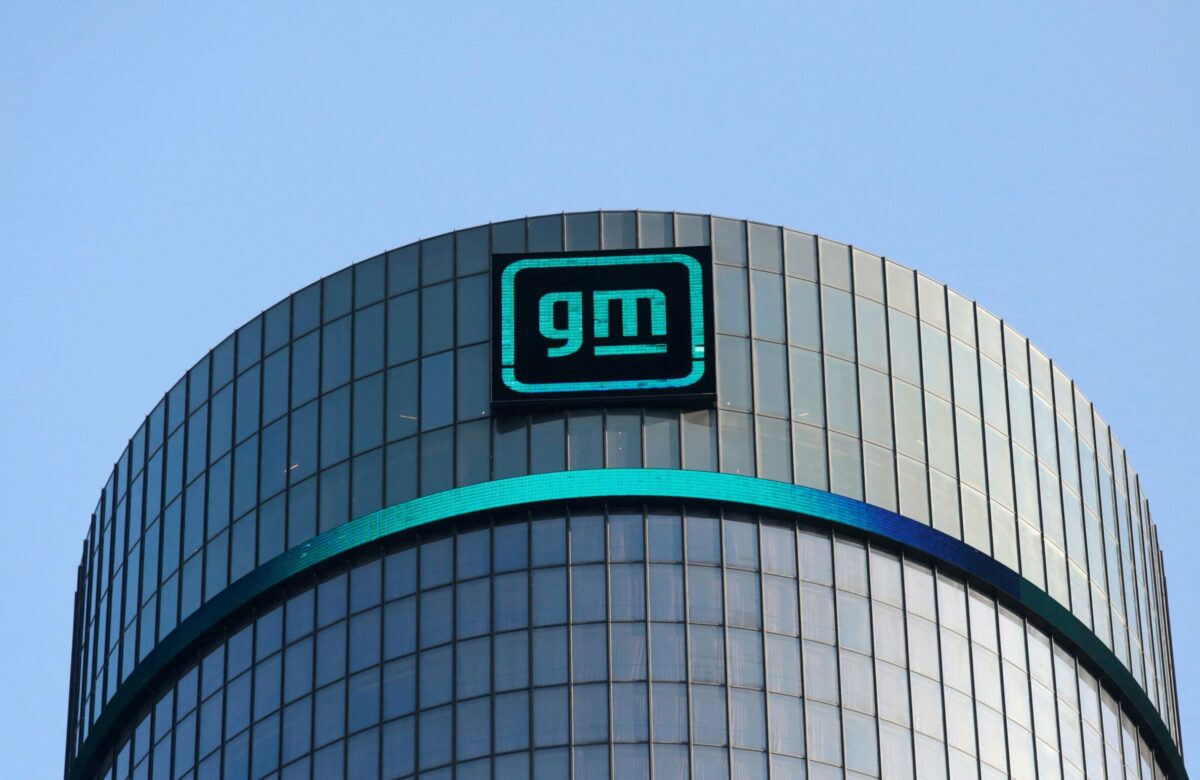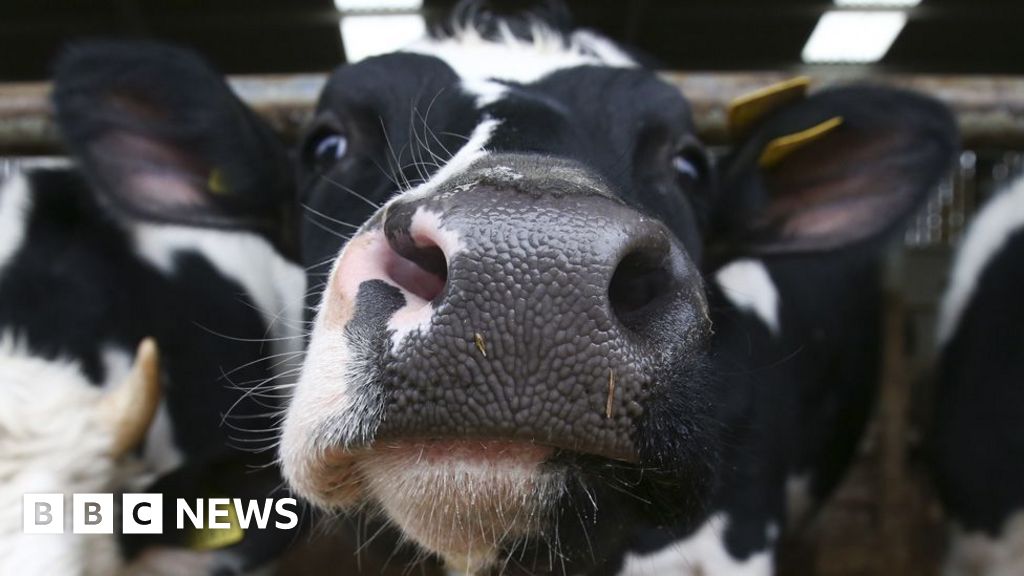
More cows kept in UK ‘megafarms’, animal welfare campaigners warn
- Science
- August 18, 2024
- No Comment
- 241
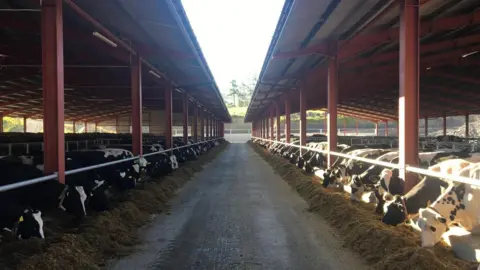 Fraser Jones
Fraser JonesMore cows could be kept indoors for the whole of their productive lives, animal welfare campaigners have warned, after the BBC found a rise in “megafarms”.
Freedom of Information (FOI) requests by the BBC show the number of larger-scale beef and dairy farms in Britain has increased from 756 to 802 in five years, now holding more than 915,000 cattle.
Campaign group Compassion in World Farming (CiWF) said the rise in large-scale cattle farming was “deeply concerning” as many would be intensive “megafarms” housing cattle all year round.
The NFU said it was neither farm size nor whether cattle were kept outdoors or indoors that dictated welfare but how livestock were managed.
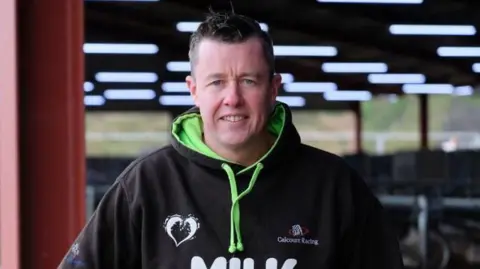 Fraser Jones
Fraser JonesWhile there is no formal definition of a “megafarm” in the UK, it is a term commonly used by animal welfare campaigners to describe a large-scale farm confining its livestock and using intensive farming practices.
To label a cattle farm as a “megafarm”, the US definition of a concentrated animal feeding operation (CAFO) is often used. A business is a CAFO if it houses 700 dairy or 1,000 beef cattle.
The BBC submitted a FOI request to the Animal and Plant Health Agency (APHA) which revealed that there were currently 802 farm operations in England, Wales and Scotland that held more than 700 dairy or beef cattle.
One farm business has a recorded capacity of up to 12,000 cattle, although any one farm may hold its cattle in smaller herds over a number of different sites.
In Northern Ireland, there are 141 farms with more than 700 cattle, holding a total of more than 141,000, according to the Department of Agriculture, Environment and Rural Affairs (Daera).
None of the UK’s devolved administrations could provide the exact number of large-scale farms using continuously housed cattle systems, which animal welfare campaigners often refer to as “megafarms”.
The UK government’s most recent Cattle Farm Practices Survey, published in 2019, found that 8% of larger farms in England with at least 150 cattle kept their herds indoors all year round.
The survey found that up to 3% of smaller farms with fewer than 150 cattle used no-graze systems.
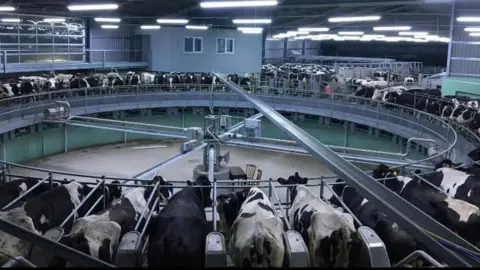 Fraser Jones
Fraser JonesOne farmer, who continuously houses up to 1,000 dairy cows on one site, told the BBC he believed the current estimate of the number of farms using such ‘no-graze’ systems was “too low”.
Fraser Jones, a third-generation farmer in Powys, Wales, who has 5,000 cattle in total across seven sites, said: “A lot of people are doing it but they don’t always say it because they know it causes a backlash.”
Mr Jones said more and more farmers were turning to such indoor systems because they protected cattle from the impacts of extreme weather and allowed greater monitoring and control of their health and nutritional intake, producing a better milk yield.
Mr Jones said the key to ensuring high animal welfare standards centred on the staff a farm employed, the training they received and how livestock was managed.
“If you are not treating your animals right they are not going to perform. They are not going to produce enough milk. It’s as simple as that,” he said.
‘Serious concerns’
CIWF said the rise in cattle “megafarms” had “gone unnoticed” as many were hidden from public view.
Anthony Field, CIWF’s UK head, said of the figures obtained by the BBC’s FOI request: “This deeply concerning data clearly illustrates their sheer scale and the desperate, broken, and unsustainable food system we have created.”
Critics say intensive no-graze systems can lead to poor health conditions, with disease spreading in crowded sheds and the routine overuse of antibiotics, leading to the potential growth of antimicrobial resistance.
The RSPCA said it was opposed to a “move towards permanently housing cattle, whether beef or dairy”.
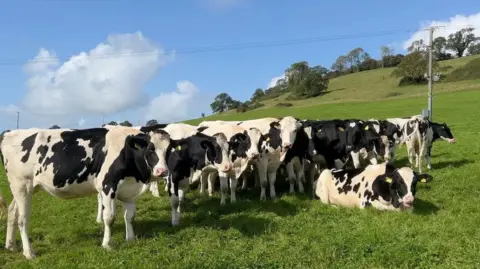
However, the NFU said that continuously housed cattle “megafarms” were still not common in the UK.
It said there were less than 20 farms with more than 5,000 beef cattle and just a “few farms” with more than 1,000 milking cows.
The NFU’s Vice-President, Rachel Hallos, said: “Animal husbandry, health, welfare and adherence to established biosecurity protocols are the most important factors for good on-farm practice, not the size or type of farm system.”
Farm industry body the Agriculture and Horticulture Development Board said the average herd size on a UK dairy farm was currently 152 cows and that the majority of large-scale farms would still be grazing cattle outdoors.
But Liam Sinclair, professor of animal science at Harper Adams University, said economic pressures had been forcing dairy farms to increase herd size for the past 50 years.
‘Inside from birth’
That, he said, often came with the problem of lack of available land for grazing.
“As herds increase in size and grazing becomes more difficult to manage it is more likely that cows will remain inside continuously – and from birth,” he said.
The Department for Environment, Food and Rural Affairs (Defra) said it could not comment on the business decisions of farms that chose to develop and operate large-scale units.
All the UK’s devolved governments said they were committed to upholding the highest standards when it came to farm animal welfare.
#cows #megafarms #animal #welfare #campaigners #warn



